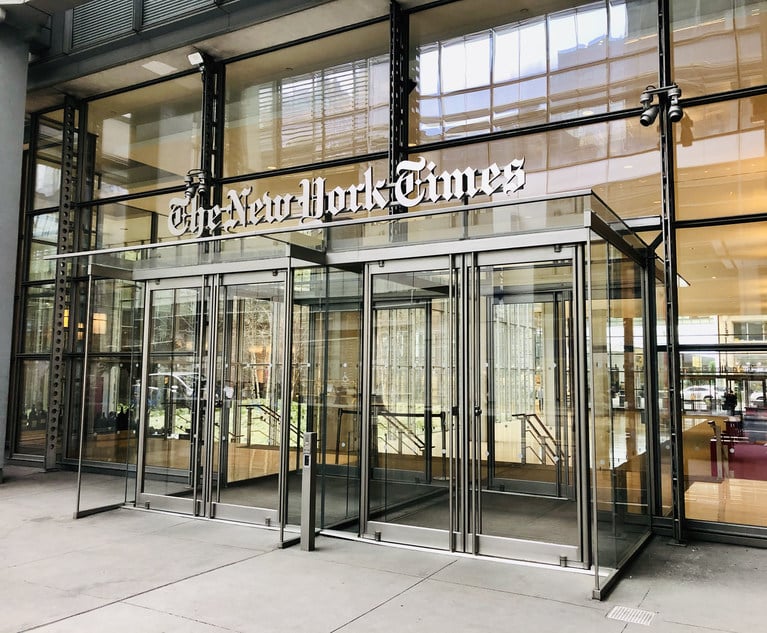 Justice Ellen Gesmer. Photo: Rick Kopstein
Justice Ellen Gesmer. Photo: Rick KopsteinMentally Ill Defendant Can Challenge Judge's 'Danger' Finding in Jury Rehearing, Appeals Panel Rules
Calling “retention orders” of any person a “basic liberty issue,” an Appellate Division, First Department panel wrote that the defendant, “Marco G.,” did not waive his jury-rehearing right because his attorney called him "dangerous" during a court hearing.
October 23, 2018 at 03:38 PM
5 minute read
A state appeals court has ruled that a defendant found to be not responsible for crimes due to mental illness—who a judge subsequently found to be dangerous and committed to a secure psychiatric facility—has the right to challenge the judge's “danger” finding in a rehearing before a jury despite his own lawyer stating in court that he's “dangerous.”
Calling “retention orders” of any person a “basic liberty issue,” an Appellate Division, First Department panel wrote that “Marco G.”—who in 1998 was found not responsible for multiple sex offenses and attempted assault, due to mental disease or defect—did not waive his jury-rehearing right because his attorney made statements about him in court.
“Any statements made at the original hearing [regarding whether Marco G. should be confined to a secure facility for six months] are not dispositive since a [jury] rehearing and review is a trial de novo,” Justice Ellen Gesmer, on behalf of a unanimous panel, wrote.
“By its very definition, a 'trial de novo' is '[a] new trial on the entire case—that is, on both questions of fact and issues of law—conducted as if there had been no trial in the first instance,” Gesmer also wrote, citing Black's Law Dictionary (10th ed. 2014).
She added, “While the statements made by or on behalf of defendant might present issues for cross-examination at the jury trial, they cannot provide a basis for the court to deny the jury trial to which defendant is entitled.”
In 2013, Marco G.—whose last name is not stated in the opinion—had been found by the Manhattan Supreme Court to be mentally ill but no longer suffer from a “dangerous mental disorder,” and therefore, for the first time, he was sent to a non-secure psychiatric facility. The state-required periodic evaluations of mentally ill detained defendants must assess their status at the time of that court hearing, Gesmer noted.
In 2015, the state Office of Mental Health sought to recommit Marco G. to a secure facility, arguing he was indeed dangerous. Subsequently, in 2017, the Supreme Court agreed, finding that OMH had established that Marco G. possessed “a level of dangerousness to himself or others which warranted secure confinement.” Marco G. was then ordered to be recommitted to a secure facility for six months, Gesmer wrote.
Marco G. soon challenged the recommitment, under CPL 330.20(16), the state statutory provision that allows those committed to ask for a jury rehearing.
OMH cross-moved to dismiss Marco G.'s petition, pointing in part to his attorney and an expert both saying at the 2017 hearing that he was mentally ill and should be kept in a locked facility.
Specifically, Marco G.'s counsel—unnamed in the panel's decision—had said at the 2017 hearing, according to Gesmer: “[Defendant is] locked up. We are not releasing him to the community. … He's not going into the community. He is at Manhattan Psych. … He's staying in a locked facility. … [Defendant] is dangerous enough to be held in MPC, granted, but not to be sent to a secure facility.”
In 2018, Manhattan Supreme Court Justice Lisa Sokoloff denied Marco G.'s petition for the de novo rehearing before a jury.
Gesmer and the panel, in their Oct. 18 opinion, overruled Sokoloff, while giving several reasons—in addition to Marco G.'s right to a de novo jury hearing—for doing so.
“Unlike an appellate proceeding, which reviews the record on appeal for error, a rehearing and review seeks to ascertain an insanity acquittee's mental condition at the time the rehearing and review is conducted,” wrote Gesmer, adding, “While any statements made by or on behalf of defendant at the initial hearing might be relevant to defendant's mental status at the time of the rehearing, they cannot provide a basis for the court to deny defendant a jury trial to prove his mental condition at that later time.”
Joined by Justices Dianne Renwick, Rosalyn Richter, Sallie Manzanet-Daniels and Peter Tom, she also noted that, “as the Court of Appeals has stated, '[T]he decision whether to have a jury resolve the pertinent issues is vested in the patient, not the court,'” quoting, Jamie R.
“Accordingly, a holding that a defendant's right to a jury trial could be waived by his counsel's or his expert's statements at an underlying hearing is simply illogical,” Gesmer added in New York State Office of Mental Health v. Marco G.
Diane Goldstein Temkin, a principal attorney at Mental Hygiene Legal Service, represented Marco G. in the petition and could not be reached for comment Tuesday.
The state Attorney General's Office, which represented the Office of Mental Health, referred questions to OMH. OMH could not be reached for comment.
This content has been archived. It is available through our partners, LexisNexis® and Bloomberg Law.
To view this content, please continue to their sites.
Not a Lexis Subscriber?
Subscribe Now
Not a Bloomberg Law Subscriber?
Subscribe Now
NOT FOR REPRINT
© 2025 ALM Global, LLC, All Rights Reserved. Request academic re-use from www.copyright.com. All other uses, submit a request to [email protected]. For more information visit Asset & Logo Licensing.
You Might Like
View All
New York Times Moves for $100K in Attorney Fees Against Dfinity Foundation
3 minute read
Federal Judge Slaps Down the SEC’s Attempt to Regulate Crypto Liquidity Providers
10 minute read
A Client Is Guilty; But Another Man Is Wrongfully Convicted

Trending Stories
Who Got The Work
Michael G. Bongiorno, Andrew Scott Dulberg and Elizabeth E. Driscoll from Wilmer Cutler Pickering Hale and Dorr have stepped in to represent Symbotic Inc., an A.I.-enabled technology platform that focuses on increasing supply chain efficiency, and other defendants in a pending shareholder derivative lawsuit. The case, filed Oct. 2 in Massachusetts District Court by the Brown Law Firm on behalf of Stephen Austen, accuses certain officers and directors of misleading investors in regard to Symbotic's potential for margin growth by failing to disclose that the company was not equipped to timely deploy its systems or manage expenses through project delays. The case, assigned to U.S. District Judge Nathaniel M. Gorton, is 1:24-cv-12522, Austen v. Cohen et al.
Who Got The Work
Edmund Polubinski and Marie Killmond of Davis Polk & Wardwell have entered appearances for data platform software development company MongoDB and other defendants in a pending shareholder derivative lawsuit. The action, filed Oct. 7 in New York Southern District Court by the Brown Law Firm, accuses the company's directors and/or officers of falsely expressing confidence in the company’s restructuring of its sales incentive plan and downplaying the severity of decreases in its upfront commitments. The case is 1:24-cv-07594, Roy v. Ittycheria et al.
Who Got The Work
Amy O. Bruchs and Kurt F. Ellison of Michael Best & Friedrich have entered appearances for Epic Systems Corp. in a pending employment discrimination lawsuit. The suit was filed Sept. 7 in Wisconsin Western District Court by Levine Eisberner LLC and Siri & Glimstad on behalf of a project manager who claims that he was wrongfully terminated after applying for a religious exemption to the defendant's COVID-19 vaccine mandate. The case, assigned to U.S. Magistrate Judge Anita Marie Boor, is 3:24-cv-00630, Secker, Nathan v. Epic Systems Corporation.
Who Got The Work
David X. Sullivan, Thomas J. Finn and Gregory A. Hall from McCarter & English have entered appearances for Sunrun Installation Services in a pending civil rights lawsuit. The complaint was filed Sept. 4 in Connecticut District Court by attorney Robert M. Berke on behalf of former employee George Edward Steins, who was arrested and charged with employing an unregistered home improvement salesperson. The complaint alleges that had Sunrun informed the Connecticut Department of Consumer Protection that the plaintiff's employment had ended in 2017 and that he no longer held Sunrun's home improvement contractor license, he would not have been hit with charges, which were dismissed in May 2024. The case, assigned to U.S. District Judge Jeffrey A. Meyer, is 3:24-cv-01423, Steins v. Sunrun, Inc. et al.
Who Got The Work
Greenberg Traurig shareholder Joshua L. Raskin has entered an appearance for boohoo.com UK Ltd. in a pending patent infringement lawsuit. The suit, filed Sept. 3 in Texas Eastern District Court by Rozier Hardt McDonough on behalf of Alto Dynamics, asserts five patents related to an online shopping platform. The case, assigned to U.S. District Judge Rodney Gilstrap, is 2:24-cv-00719, Alto Dynamics, LLC v. boohoo.com UK Limited.
Featured Firms
Law Offices of Gary Martin Hays & Associates, P.C.
(470) 294-1674
Law Offices of Mark E. Salomone
(857) 444-6468
Smith & Hassler
(713) 739-1250






